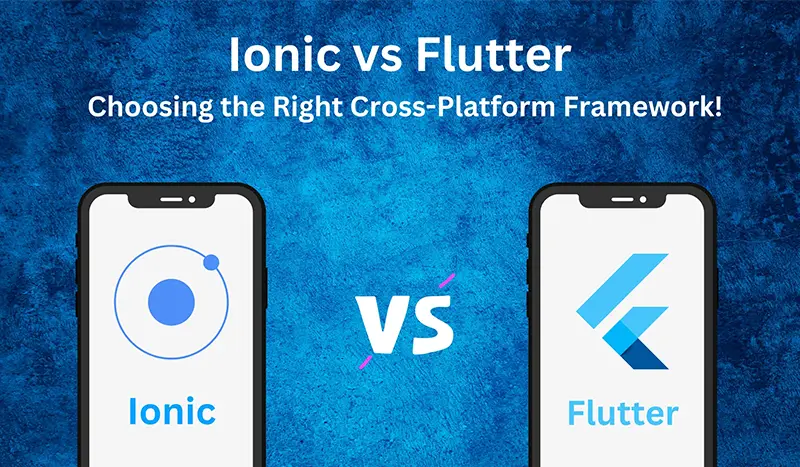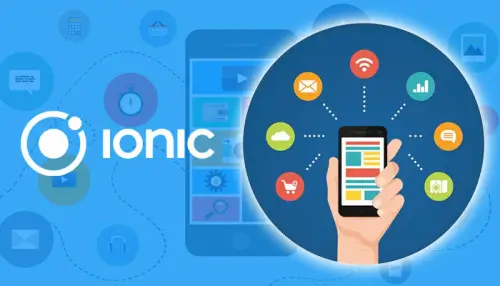In today’s fast-paced world, mobile app development has become a critical aspect of business success. As a result, cross-platform frameworks have gained significant traction, offering developers the ability to build applications for multiple platforms with a single codebase. Two prominent contenders in this space are Ionic and Flutter. In this blog post, we will delve into a comprehensive comparison of Ionic vs Flutter, exploring their strengths, weaknesses, and key differences. By the end, you’ll have a better understanding of which framework suits your specific project requirements.
Ionic vs Flutter: An Overview
To start our comparison, let’s first understand what Flutter and Ionic are and their key features and advantages.
Flutter
Developed by Google, Flutter is an open-source UI toolkit that enables developers to create high-performance applications for multiple platforms, including iOS, Android, web, and desktop, from a single codebase. It uses Dart as its programming language and boasts a rich set of customizable UI components. Flutter’s hot-reloading and debugging capabilities greatly enhance the development process.
Ionic
Ionic, on the other hand, is an open-source framework that allows developers to build cross-platform mobile applications using web technologies such as HTML, CSS, and JavaScript. It leverages popular web development frameworks like Angular, React, or Vue.js. Ionic offers a comprehensive library of UI components and provides an easy learning curve for web developers transitioning into mobile app development.
Ionic vs Flutter: Development Environment
Comparing the development environments of Ionic and Flutter will give us insights into the programming languages, tools, and customization options available.
Language and Syntax
Flutter uses Dart, a modern and object-oriented programming language, which offers a familiar syntax to developers coming from languages like JavaScript or Java. Ionic, on the other hand, utilizes web technologies, making it an ideal choice for web developers who are already well-versed in HTML, CSS, and JavaScript.
Tools and IDE Support
Both Flutter and Ionic have a robust set of tools and IDE support. Flutter provides its own integrated development environment called “Flutter SDK,” which offers features like hot-reloading, widget inspector, and a command-line interface. Ionic developers can utilize popular IDEs such as Visual Studio Code or WebStorm, along with a variety of command-line tools and plugins.
UI Components and Customization
Flutter’s UI components, known as “widgets,” are highly customizable, allowing developers to achieve pixel-perfect designs across multiple platforms. Ionic offers a wide range of pre-built UI components based on web standards, allowing developers to create visually appealing and responsive apps.
Hot-reloading and Debugging Capabilities
Flutter’s hot-reloading feature enables developers to see instant changes in their app’s UI without losing the application’s state. It greatly speeds up the development process and makes debugging easier. Ionic also supports hot-reloading, allowing developers to view changes in real-time.
Ionic vs React Native vs Flutter: Performance and User Experience
Performance and user experience are crucial aspects of mobile app development. Let’s compare the performance and user experience capabilities of Ionic, Flutter, and React Native.
Rendering and Performance Optimization
Flutter employs its own rendering engine called Skia, which enables it to achieve high-performance graphics rendering. This results in smooth animations and a responsive user interface. Ionic, being built on web technologies, relies on the device’s web view for rendering, which may not offer the same level of performance as Flutter’s native rendering engine.
Native-like UI and User Experience
Flutter provides a native-like user experience by using its own set of widgets and maintaining consistent UI across platforms. This results in visually appealing and platform-specific UI components. Ionic, although built with web technologies, uses a mix of native and web components to achieve a similar native-like experience.
Third-party Library Support
Flutter has a vast and growing ecosystem of third-party libraries and packages available through the Dart package manager, Pub. This extensive library support allows developers to access a wide range of functionality and services. Ionic, being built on web technologies, can leverage existing JavaScript libraries and frameworks, giving it access to a large collection of third-party resources.
Device APIs and Native Features Integration
Both Ionic and Flutter offer access to device APIs and native features. Flutter achieves this by using platform-specific channels, allowing developers to integrate device functionalities seamlessly. Ionic, being built on web technologies, provides access to a wide range of device APIs through plugins and utilizes Capacitor or Cordova for native features integration.
Ionic vs Flutter vs React Native: Deployment and Market Reach
When choosing a cross-platform framework, it’s essential to consider deployment options and the platform reach. Let’s compare Ionic and Flutter based on these factors.
Platform Support
Flutter provides excellent platform support, allowing developers to build applications for iOS, Android, web, and desktop. It ensures consistent behavior across all platforms, making it an ideal choice for applications that target multiple devices. Ionic, too, supports iOS, Android, and web platforms, providing developers with a broad range of deployment options.
App Store Acceptance and Guidelines Adherence
Both Ionic and Flutter apps can be published on major app stores, but it’s important to consider their adherence to platform-specific guidelines. Flutter’s native-like UI components and performance optimization techniques generally result in smooth app acceptance. Ionic apps, built with web technologies, may require additional effort to meet platform-specific design guidelines.
Code Sharing and Maintainability
One of the significant advantages of cross-platform frameworks is code sharing. Flutter allows developers to share a substantial amount of code across different platforms, resulting in reduced development time and effort. Ionic, with its web technologies foundation, also facilitates code sharing. However, platform-specific tweaks may be required to achieve a seamless experience on different devices.
Time to Market and Development Cost
Flutter’s hot-reloading and rapid development capabilities can significantly reduce time to market. Its single codebase approach also minimizes development costs compared to building separate native apps. Ionic, leveraging web technologies, provides a similar advantage of faster development and reduced costs. However, the development time may be slightly longer due to platform-specific adjustments.
Ionic vs Flutter: Use Cases and Industry Adoption
To understand the practical application of Ionic and Flutter, let’s explore some use cases and examples of industry adoption for each framework.
Mobile App Examples Built with Ionic
Ionic has been widely used for building applications across various industries, including e-commerce, healthcare, education, and entertainment. Popular apps like Sworkit, MarketWatch, and Pacifica have been developed using the Ionic framework.
Mobile App Examples Built with Flutter
Flutter has gained traction in industries such as finance, travel, entertainment, and social media. Notable examples include apps like Alibaba, Google Ads, Reflectly, and Topline.
Industry Domains and Scenarios Suitable for Each Framework
Ionic’s web technologies foundation and broad platform support make it an excellent choice for businesses that prioritize time to market, cost-effectiveness, and a wide market reach. Flutter’s focus on performance, native-like UI, and seamless user experiences make it ideal for apps that require high-quality graphics, animations, and a consistent user interface across multiple platforms.
Case Studies of Successful Apps using Ionic and Flutter
Ionic has been used to build successful applications such as Untappd, a beer discovery and social networking app, and Nationwide, a popular banking and insurance app. Flutter has been utilized to create apps like Hamilton, the official app for the hit musical, and Tencent’s Now Live, a live streaming app with millions of active users.
Conclusion: Making the Right Choice
When choosing between Ionic vs Flutter, consider your project requirements, team expertise, and long-term goals. Evaluating factors like performance, UI customization, available libraries, community support, deployment options, and market reach is a must. Both Ionic and Flutter offer compelling features and advantages for cross-platform mobile app development. Flutter’s Dart programming language, rich UI components, and native-like user experiences make it a robust choice for building high-performance apps. Ionic’s utilization of web technologies and broad platform support, coupled with its ease of learning, make it an attractive option for web developers transitioning into mobile app development.
OdiTek is a leading software development company with expertise in both Ionic and Flutter. Our experienced developers can build custom mobile applications that meet your specific needs. Whether you are looking for a native app, a hybrid app, or a web app, we can help you create a solution that is both user-friendly and effective.
If you are looking for a reliable and experienced software development partner, contact OdiTek today. We would be happy to discuss your project and help you create a mobile app that meets your needs.







